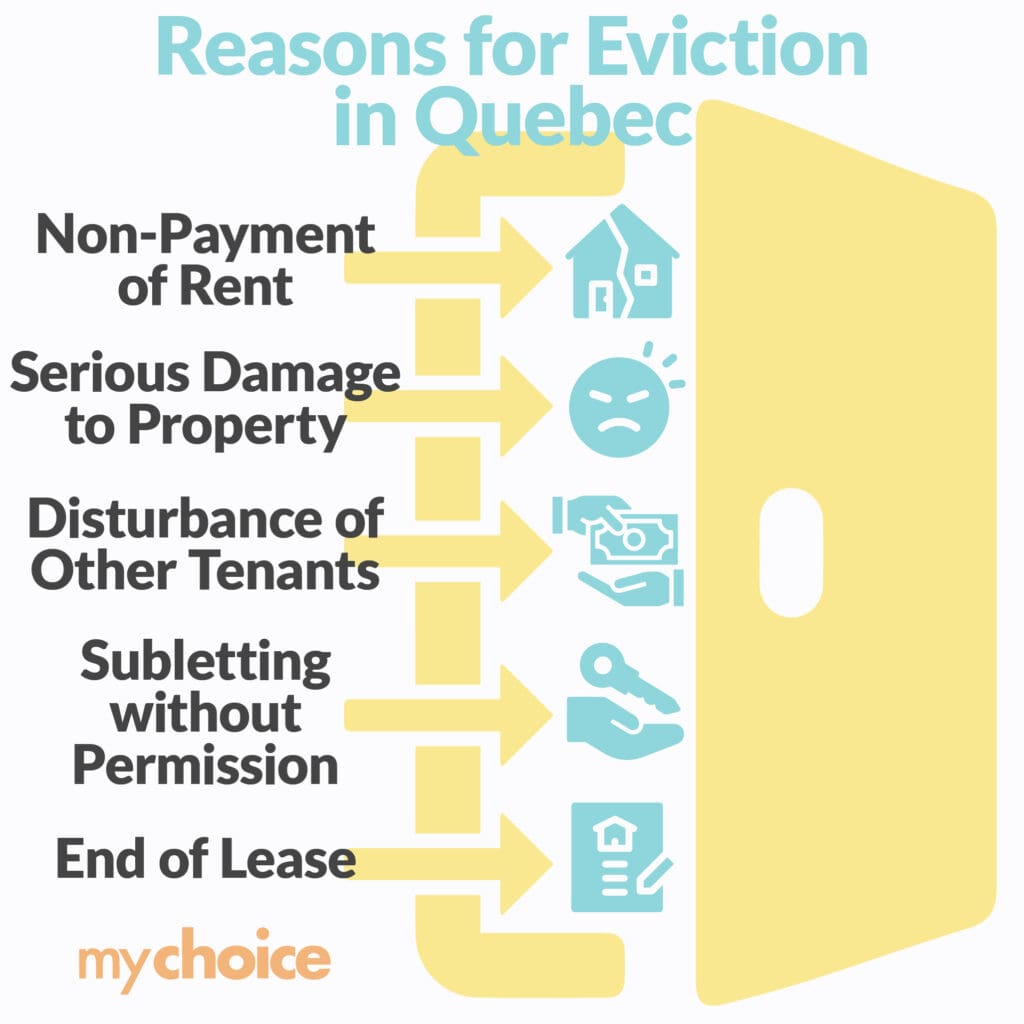Understanding tenant rights and obligations is critical for a smooth, hassle-free relationship with your Quebec landlord. Tenants who don’t handle their responsibilities under their lease can be evicted, but even then, eviction is strictly regulated and has rules like minimum notice periods to protect tenant rights.
When can a landlord evict a tenant in Quebec, and what legal processes do they have to follow? Read our guide to learn the different valid reasons for eviction, how Bill 31 has affected rules on housing and eviction, as well as your rights as a tenant.
When Can a Landlord Evict a Tenant in Quebec?
Renting a property in Quebec comes with specific obligations, and not following through on these obligations can lead to eviction. These are the primary reasons for Quebec landlords to evict tenants:\

Rules for an Eviction Notice in Quebec
In addition to evicting only on certain grounds, Quebec landlords must follow these requirements when issuing an eviction notice to a tenant:
Additional Rights and Obligations of Quebec Tenants
Just as landlords have to follow certain rules and requirements, Quebec tenants have rights and responsibilities that they should know about and uphold, such as:
- Prohibitions on discrimination: The Charter of Human Rights and Freedoms prohibits landlords from discriminating against tenants based on race, religion, colour, language, or sexual orientation. Discriminatory acts can be reported to the Commission des droits de la personne et des droits de la jeunesse.
- Responsible rental unit usage: Tenants must use the rental unit responsibly, keep it clean, and repair any damages that they or their guests cause to the property.
- Notification about serious repairs: Tenants must inform landlords promptly about serious problems that need repairs, such as clogged pipes or damaged roofing. If the landlord doesn’t take care of the problem, tenants can arrange for repairs and seek reimbursement for the cost.
- Rules on access and visitation: Landlords can’t include clauses restricting guests or having additional occupants like family members or roommates.
- Rules on renovations: Apart from requiring a minimum 10-day period to notify tenants of major renovations, landlords aren’t allowed to raise rent post-renovation for the current lease period.
- Protection from noise concerns: Tenants have the right to peacefully enjoy their rented homes without disturbances. If they are disturbed by other tenants, they can first try to amicably resolve the issue. However, a formal notice can later be sent to the landlord with a deadline for action. If the deadline passes without a solution, the tenant can file an application with TAL to assert their rights.
- Restrictions on pets within the rented property: Generally, landlords may include a lease clause prohibiting tenants from having any kind or certain kind of pets. An exception under the Charter of Human Rights and Freedoms is made for tenants who need service animals to assist them with their disabilities.
Recent Updates Related to Eviction and Tenant Rights in Quebec
Bill 31 was passed on February 27, 2024, making significant changes to Quebec’s rules on eviction, hearings, and lease assignments. Here are important points from the bill that every Quebec tenant and landlord should apprise themselves of:
Key Advice from MyChoice
- Tenant insurance isn’t mandatory, but some Quebec landlords may include it as a requirement in a lease. It’s still worth it to get it as it protects your belongings and covers the cost of alternative accommodations if you need to relocate due to emergencies, as well as the cost of liability claims if you cause accidental damage.
- Quebec landlords can’t legally prevent you from having overnight guests, even if they try to enforce a restriction clause that threatens eviction. Remember that you have the right to decide whom to invite to visit the property. However, note that you’ll be liable for any damages or disturbances caused by your guests.
- New buyers can’t just evict a tenant from a property after buying it from their old landlord – they’ll need to initiate repossession. This still requires proper notice and a just cause, so if a new buyer asks you to leave, remember that you don’t have to budge if they don’t follow legal requirements.








